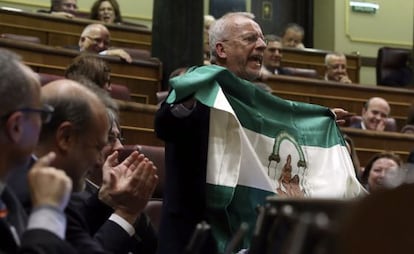The truths and half-truths from the State of the Nation Debate
EL PAÍS analyzes the claims and counter-claims made by the PM and the opposition


At Tuesday’s State of the Nation Debate, Prime Minister Mariano Rajoy was able to present some of the best economic data of his three years in power. New Socialist secretary general Pedro Sánchez, meanwhile, had his first major parliamentary opportunity, and was hoping it wouldn’t be his last. Both of the politicians, however, managed the data to suit their interests.
Unemployment. Higher or lower than at the start of Rajoy’s term? The prime minister took office on December 21, 2011. That month, registered unemployment was at 4,442,359 people. In January 2015, the number had reached 4,525,691 – that’s an increase of 103,000 people since the Popular Party took power. But Rajoy ignored those statistics by shifting the reference points for joblessness. The prime minister instead compared the registered unemployment in January 2015 with that of January 2012. “We can now say that there are 74,000 fewer registered unemployed people than in the first month of this term,” he told Congress during Tuesday’s debate.
Foreign debt. The second-highest in the world? During the debate, Rajoy evaded the fact that foreign debt levels for Spain were over 100% of GDP during his term in office so far. Sánchez reminded him of that fact with another piece of information: “We are the country with the second-highest foreign debt levels in the whole world.” The country with the highest is the United States ($5.5 trillion, which is 34% of its GDP), followed by Spain (€1.4 trillion, 103.1% of GDP), according to the International Monetary Fund (IMF). But this is not an exclusive merit of the Popular Party government. In 2006, under the Socialists, Spain was also ranked second with $862 billion of foreign debt.
Was Spain rescued or granted a loan? Rajoy’s speech focused on how Spain had avoided a bailout. “Spain is a nation that has emerged from the nightmare and has rescued itself,” he told Congress. But Sánchez denied that was true. “Spain had to be rescued as a consequence of the disastrous management of [savings bank] Bankia,” Sánchez countered. “There was a rescue, with men in black and the Troika. And all to save your soldier [Rodrigo] Rato.” But the truth is that Rajoy did not save Rato, the then-chairman of Bankia and former IMF chief. Instead he fired him from his position and replaced him. To avoid the failure of Bankia and a number of other banks, the government requested help from the European Union with a limit of €100 billion. Rajoy considered it to be a “a loan.” But the German finance minister, Wolfgang Schauble had a different opinion: “It is not the banks, but rather Spain, that is receiving the money. Now the country will have to negotiate the restructuring of its banks with the IMF and the European Central Bank.”
University scholarships. More help than ever? Rajoy repeated a number of times that the government has spent more than ever on university grants. This claim is based on the annual amount for grants and assistance forecast for 2014 (€1.465 billion). This is, indeed, the highest figure to date. But if the data is broken down by academic year (i.e. 2013-2014, 2014-2105) the figure has actually fallen. The amount spent by the government over the last two academic years has fallen from €1.784 billion for 2012-2013, to €1.472 billion for 2013-2014.
Spending cuts. Andalusia and Spain. During his first appearance, Rajoy claimed to have avoided a bailout without damaging the standard of living. Sánchez reminded him that since the Popular Party has been in power there are 18,000 fewer teachers, while 900,000 people (mostly immigrants) have left the public health system, while there are also 3,000 fewer health professionals. The prime minister accepted this, but accused the Andalusia region, which is governed by the Socialists, for part of these ills. “In Andalusia 6,100 jobs have been destroyed from the public health system in three years while 3,200 hospital beds have gone.” This data was drawn from an estimation made by the CSIF labor union and the Andalusian regional government denies it is accurate.
Tu suscripción se está usando en otro dispositivo
¿Quieres añadir otro usuario a tu suscripción?
Si continúas leyendo en este dispositivo, no se podrá leer en el otro.
FlechaTu suscripción se está usando en otro dispositivo y solo puedes acceder a EL PAÍS desde un dispositivo a la vez.
Si quieres compartir tu cuenta, cambia tu suscripción a la modalidad Premium, así podrás añadir otro usuario. Cada uno accederá con su propia cuenta de email, lo que os permitirá personalizar vuestra experiencia en EL PAÍS.
¿Tienes una suscripción de empresa? Accede aquí para contratar más cuentas.
En el caso de no saber quién está usando tu cuenta, te recomendamos cambiar tu contraseña aquí.
Si decides continuar compartiendo tu cuenta, este mensaje se mostrará en tu dispositivo y en el de la otra persona que está usando tu cuenta de forma indefinida, afectando a tu experiencia de lectura. Puedes consultar aquí los términos y condiciones de la suscripción digital.








































